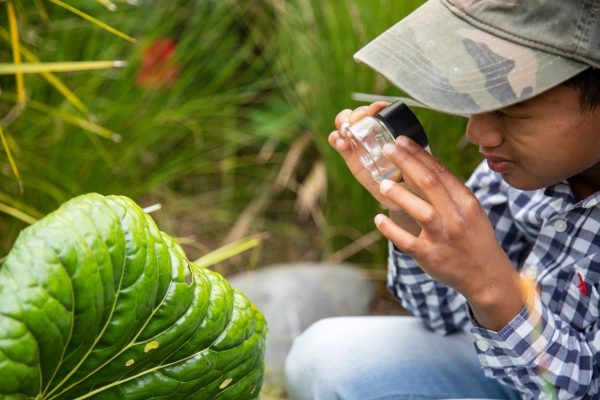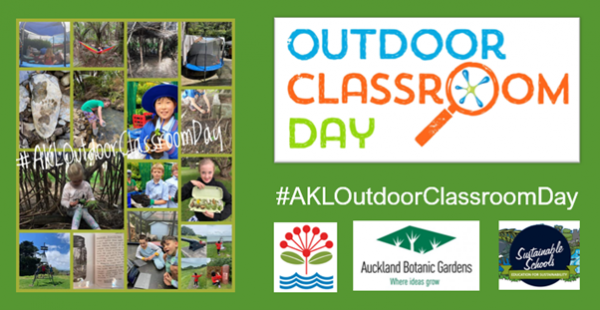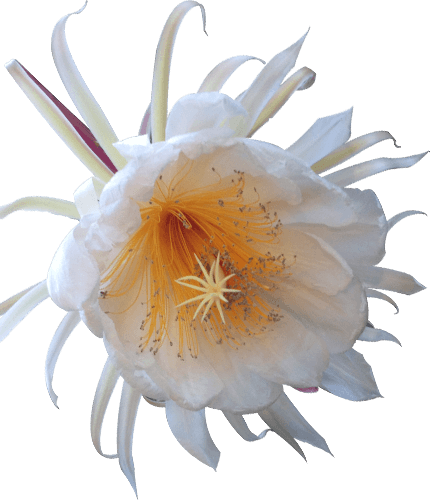
23 Nov 2021
Nurturing a love of nature at Auckland Botanic Gardens
Paul Swift and Greg Meylan
https://www.aucklandbotanicgardens.co.nz/education/
I appreciate that the majority of people reading this article will already understand and indeed actively communicate the belief that people benefit from visiting gardens and interacting with the natural world. This is not a new or outrageous claim; from classic literary texts such as Thoreau’s 1854 Life in the Woods through to modern day international best sellers like Louv’s Last Child in the Woods we have a wide body of evidence and anecdotes that establish the fact that botanic gardens are not exclusively about botanical knowledge or gardening know-how. At Auckland Botanic Gardens we view our ‘health and wellbeing’ role alongside our conservation, education, research and recreation roles.
There is growing evidence that being among nature is good for children’s mental and physical wellbeing. We are developing programmes, activities, and educational opportunities to bring children and family groups into the gardens for both formal and informal learning and to enhance their connections with nature.
In collaboration with Auckland Parks and the Council’s Sustainable Schools team we hosted a series of online connecting with nature activities to celebrate World Outdoor Classroom Day on 4th November. We had of course intended this to be an event that took place in the Gardens however Covid lockdowns meant that we had to adapt to online delivery. #AKLOutdoorClassroomDay was a great success with over 48,000 people reached and a 3000% increase in viewers compared to the week before.
In order for children to grow up as adults that care about the natural world, it greatly helps if they have developed a love and an appreciation for it during childhood. Or in the words of George Orwell: “I think that by retaining one’s childhood love of such things as trees, fishes, butterflies and toads, one makes a peaceful and decent future a little more probable…”
But technology, and the distraction offered by the digital world, mean that most children spend less time in nature than they used to. A 2009 study by Natural England found less than 10% of children today play in natural places compared to 40% of children doing so in the 1970s and 1980s.
Which is why we have developed structured introductions to nature, such as focussed activities, opened-ended exploration challenges, outdoor classrooms and holiday programmes designed to engage with the natural environment.
We have a programme of engagement for children which includes in-person holiday activities, monthly sessions for under-5s, and a range of activity and trail sheets that guide parent-child visits to various part of the gardens.
Auckland Council’s Sustainable Schools team, which operates out of the Botanic Gardens also offers ‘experiential learning’ outside of the classroom for primary and intermediate aged kids. These are lessons that focus on direct experience of the subject, and engaging children’s hands, heads and hearts through learning by doing.
The belief is that children who learn outdoors know more, understand more, feel better, behave better, work more cooperatively and are physically healthier.
Some of the most striking benefits of learning in nature accrue to those children who find the classroom environment the most difficult. Children with ADHD and other neurodivergent ways of thinking often end up startling teachers with their insights and enthusiasm when they are in nature, compared to within the four walls of the classroom.
The vast majority of children that visit the Botanic Gardens with their schools are aged between 5 and 12 and this is great news, as according to a report by the UK’s Royal Society for the Protection of Birds, it is most important to engage kids with nature before they reach 12 years old.
“Before this age, contact with nature in all its forms but in particular wild nature appears to strongly influence a positive behaviour toward the environment. The sense of freedom of unstructured play that occurs in nature creates a source of independence and inner strength that can be drawn upon during stressful situations for the rest of their life.”
We hope that by offering activities and programmes for children and families, we facilitate a lifelong love of nature. That by reaching children and creating a safe, welcoming place for them, they will develop the confidence to roam and explore and respond spontaneously to nature.
I will end with a quote from Sir David Attenbrough which I feel captures the wider role that Botanic Garden can play in society, sustainability and wellbeing:
“no one will protect what they don’t care about; and no one will care about what they have never experienced”.
Paul Swift and Greg Meylan
Auckland Botanic Gardens



